Global sustainable development needs to be addressed through a multi-stakeholder approach, and philanthropists have an important role to play, according to Jeffrey D. Sachs, director of the UN Sustainable Development Solutions Network, during his presentation, “China’s Leadership in Global Sustainable Development” at PHBS on January 10.
The Columbia University professor and the university’s director of the Center for Sustainable Development drew a full house at the PHBS basement auditorium. Cited by the New York Times as “probably the most important economist in the world” and by Time Magazine as “the world’s best known economist,” Sachs became Harvard’s youngest tenured full professor at age 28 in 1983.
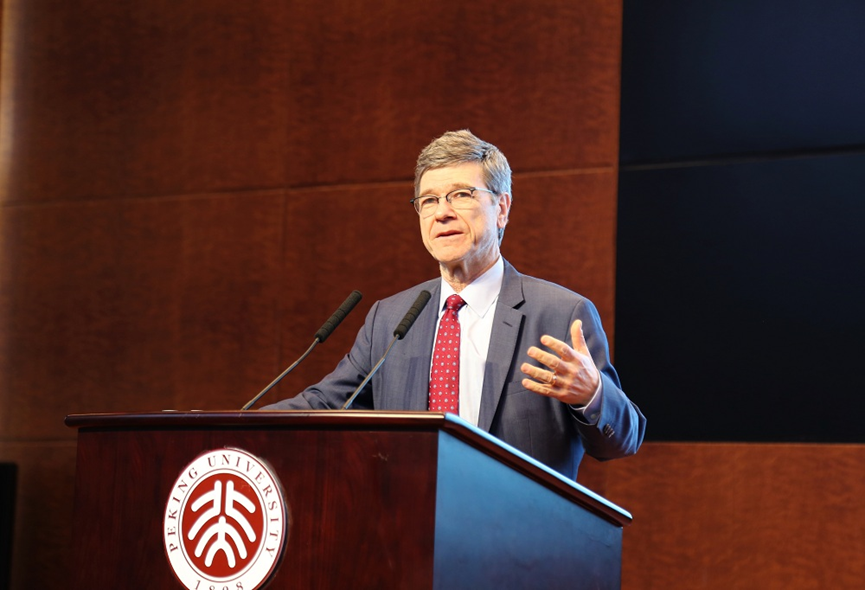
World renowned economist Jeffrey D. Sachs.
In his opening remarks, Sachs recalled his impression of Shenzhen at his first visit 25 years ago. "It was quite different from now, " Sachs said with a smile that brought chuckles from the audience. He marveled at the tremendous changes within three decades, saying, “The development in China is beyond belief, unparalleled in history.” Yet he added that as China is becoming the biggest economy in the world, it shoulders a profound global responsibility. “The world needs China’s leadership.”
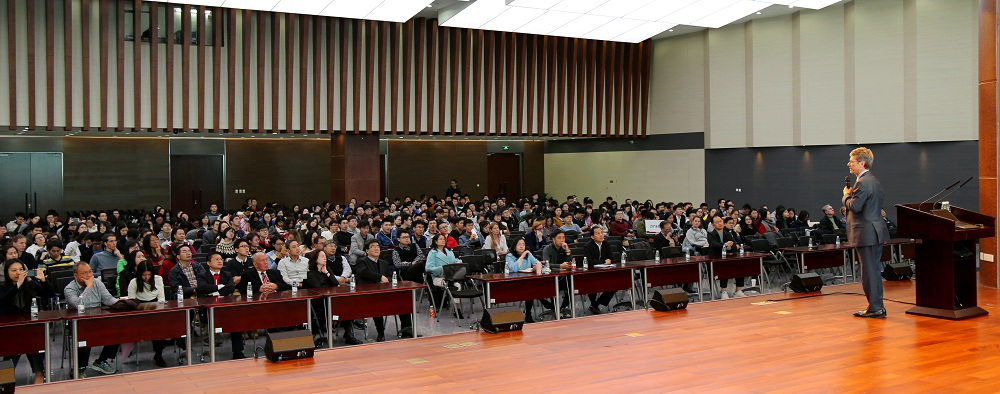
The PHBS basement auditorium is packed for Sachs’s appearance.
Then, Sachs discussed that the world is moving into a new economic paradigm, introducing a number of slides looking at various economic indicators worldwide, such as historical development and revolution, population and environmental changes to illustrate his point. He also addressed technological innovation, which has led GDP growth and cited OECD data from 2009 focusing on patent hotspots worldwide which were mainly centered on North America, middle Europe and East Asia. Meanwhile, since 1980 East Asia, led by China, Japan, Korea and ASEAN, has embarked on a steep rising trend while the West has been on an economic downturn. He noted that in 2013, China surpassed the US in the share of world GDP and that the US no longer dominates the world economy. Sachs said that these trends indicate that with sustainable development of a dynamic economy, China will take in the worldwide lead within the coming decades.
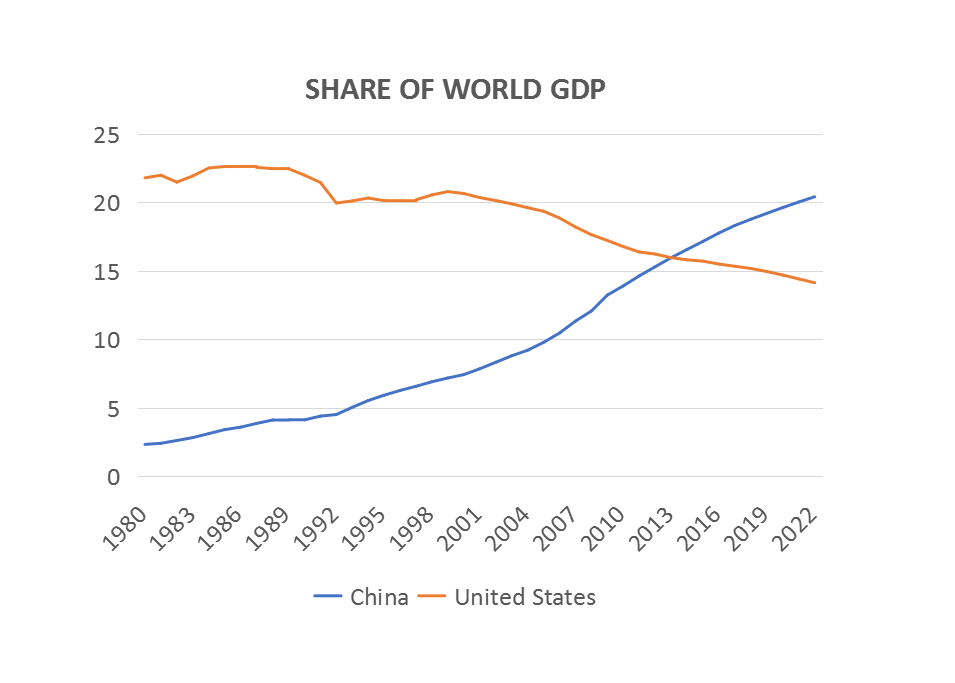
China surpassed US in the share of world GDP in 2013.
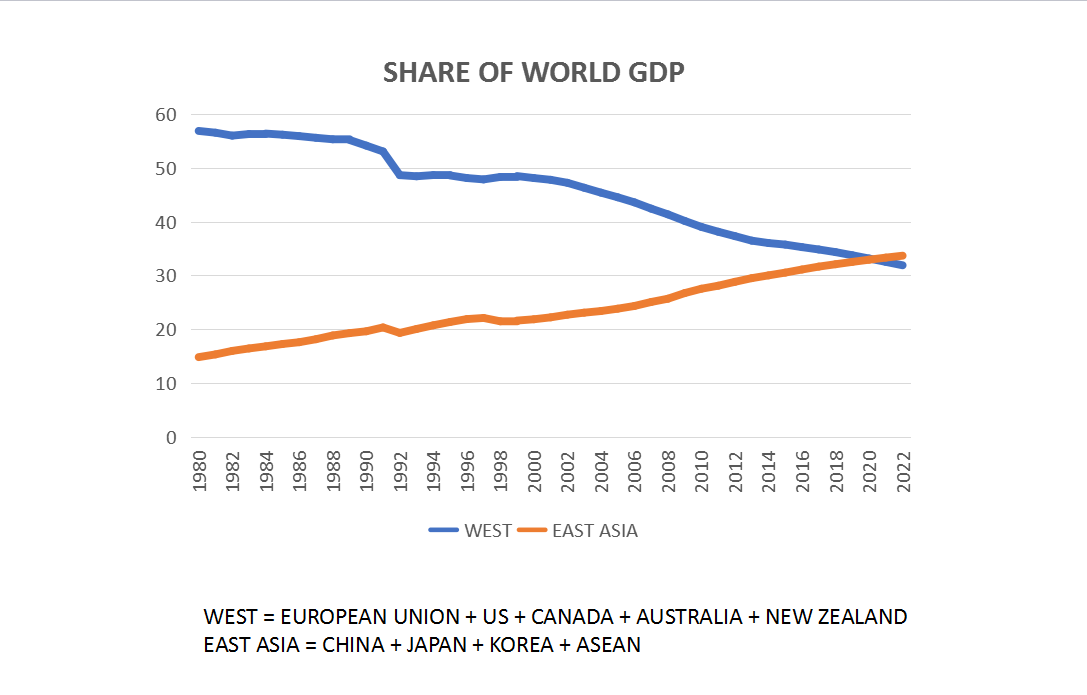
Share of World GDP since 1980
The West experienced a downturn in world GDP while that
of East Asia is rose steadily and is projected to continue its rise.
Sachs noted that the growing world population and overuse of natural resources has now led to such negative consequences as global warming, glacial melt, rising sea level, and extreme weather such as frequent hurricanes, that will challenge humankind’s long-term survival. With this scenario, he mentioned his new book
The Age of Sustainable Development, in which he reasons that only through global cooperation can individual nations overcome the interconnected global-scale crises of extreme poverty, economic instability, social inequality, and environmental degradation, etc. He suggested all countries make joint efforts in technical skills and sciences, sharing responsibility to solve problems including global warming, climate change, nuclear threats, environmental crisis, and more. He added that China, as a country with a large population and great carbon dioxide emissions, should undertake the major responsibility of protecting the environment.
Sachs then introduced the United Nations Sustainable Development Goals (SDGs), a set of 17 "Global Goals" with 169 targets adopted on September 2015: no poverty, zero hunger, good health and well-being, quality education, gender equality, clean water and sanitation, affordable and clean energy, decent work and economic growth, industry, innovation and infrastructure, reduced inequalities, sustainable cities and communities, responsible consumption and production, climate action, protection of life below water, life on land, peace, justice and strong institutions and partnership to meet these goals which apply to all countries. Sachs appealed to nations to make joint endeavors in energy transformation and use alternative energy as a substitute for coal. He said that as the world’s biggest economy and country with an enormous population, China should play a vital role in pushing forward global sustainable development through efficient energy systems, scientific agriculture development, researching green technology, and education development, and so on.
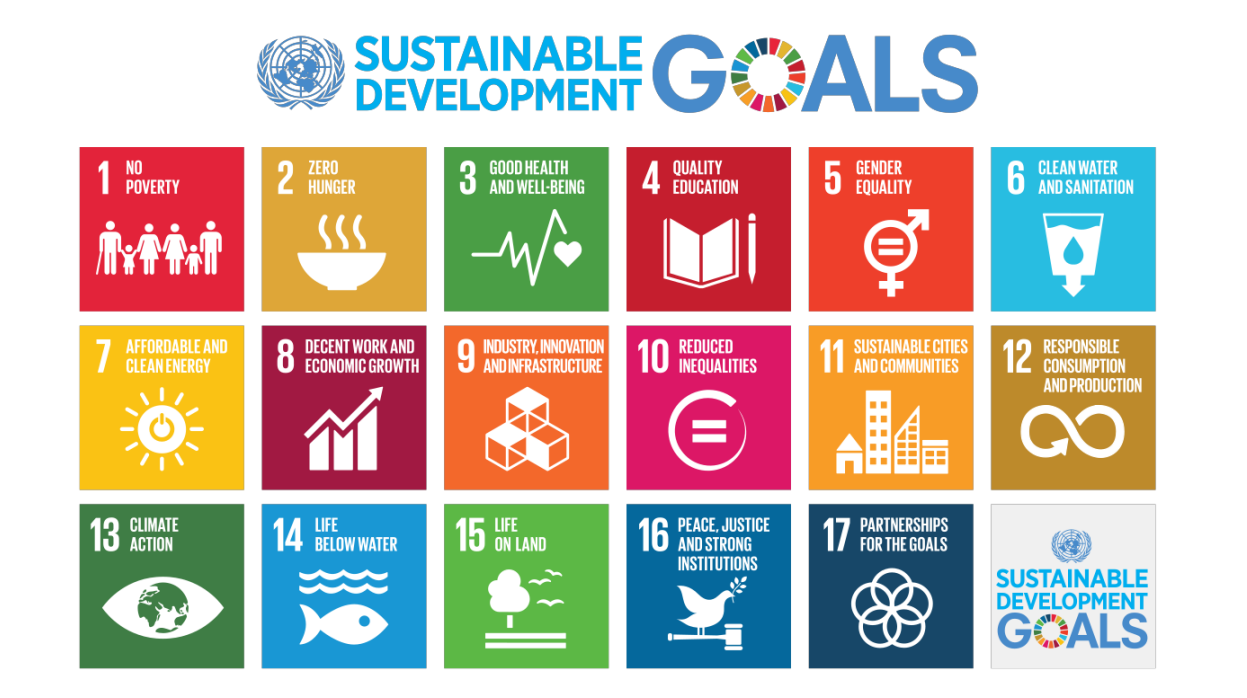
UN Sustainable Development Goals
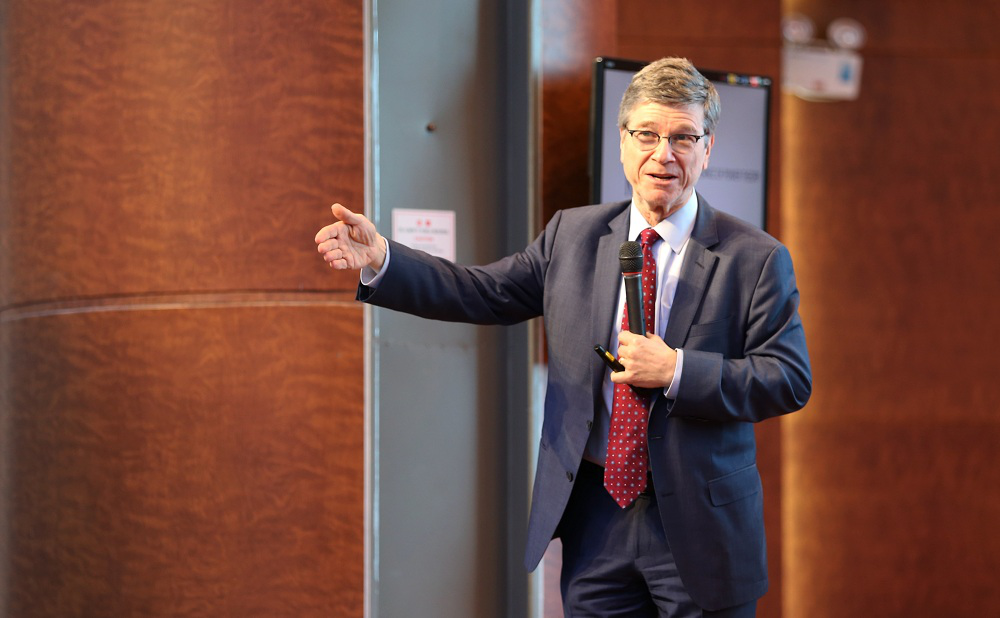
Sachs appeals to countries to make joint endeavors in global sustainable development
At the end of this speech, Sachs called for universities to cooperate worldwide, saying that knowledge is vital for getting rid of poverty. He hopes such world renowned universities as Peking University and Tsinghua University, for example, would make joint efforts to build a global knowledge network, writing a new chapter of education in supporting sustainable development. On noting that PHBS established its UK campus in
Oxfordshire, England in 2017, this genial economist smiled and said, “I hope PHBS can establish another campus in New York.”
During the Q&A session, several students asked about such topics as agricultural innovation, education, and investment for sustainable development. Sachs responded that “education is the most important part of sustainable development; if there is no education, there would be no development, no decent jobs.” He appealed to billionaires to donate 1% of their annual incomes to education in poor countries. He also recommended online education to solve educational problems in countries, such as Africa, where educational access is not widely available.
As a business school with internationalization, PHBS remains focusing on education. Located in Shenzhen, China's first Special Economic Zone, and adjacent to the Asian financial hub of Hong Kong, Peking University HSBC Business School is at the cutting-edge of China’s economic reform and management practices. PHBS, rooting in its internationalized mission and instructional orientation, opening a new chapter of PKU’s economics and business education, and has ascended to a top-tier business school in China within two decades. With its coursework for full-time master’s and MBA programs conducted in English, PHBS also integrates its management, teaching, curriculum and students cultivation with world-class education.
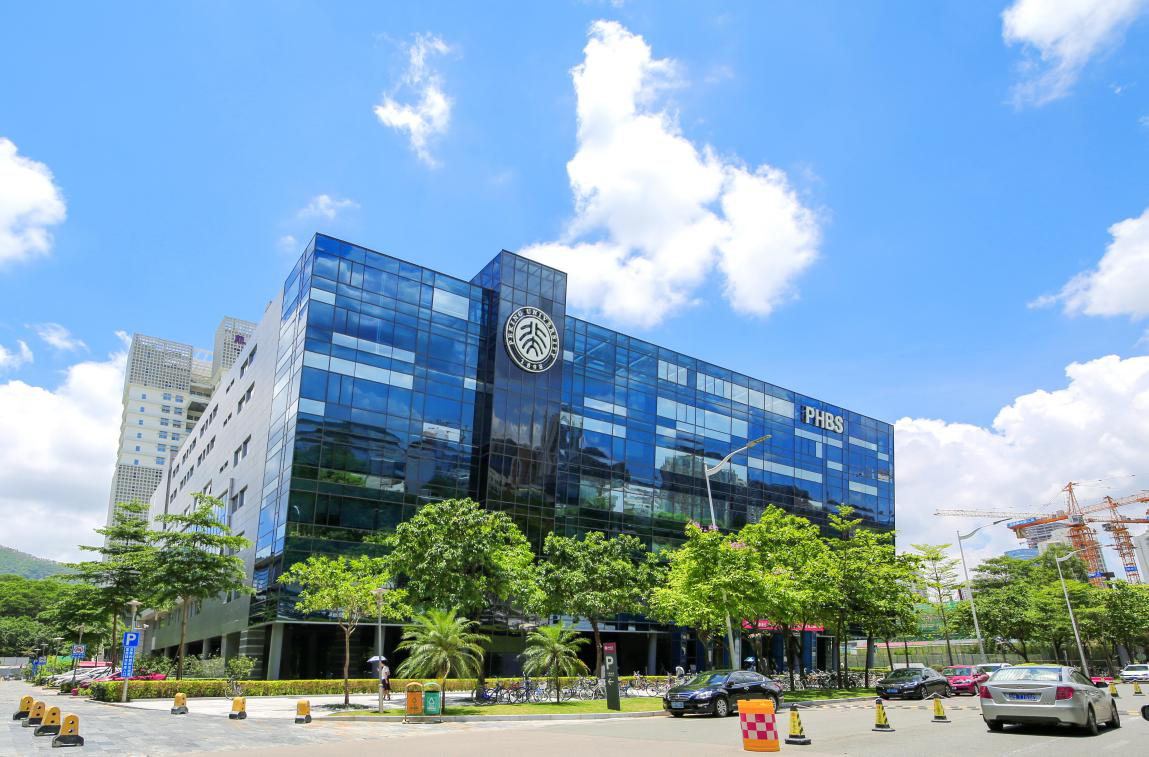
PHBS building
In February 2017, PHBS has taken a bold step to invest in a new campus in Boars Hill, Oxfordshire, England, it is Peking University HSBC Business School UK Campus. Not only is this new investment a milestone for PKU but also for the development of China’s higher education, opening its market to the world. In the future, PHBS will carry forward its internationalized mission and instructional orientation of cultivating visionary, principled and diverse leaders, march on its way to top-tier business school in worldwide.

PHBS UK Campus






















